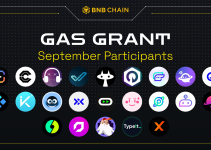
What does it take to become a validator candidate? What was their motivation to become a validator? And what’s their prediction of the BSC future? Keep reading to get unique insights from HashQuark, our next interviewed validator candidate.
Are you new to Binance Smart Chain or want to learn more about the role of validators and delegators on BSC? Read our article, A Journey to Decentralization: Validators & Delegators, for more on becoming a validator or delegator.
What is your core business, and what is your business strategy connected to being a validator?
HashQuark, as a professional infrastructure service provider, remains focused on staking services and has experience running nodes for over 50 high-quality projects, including Ethereum, Polkadot, Klaytn, and more. We’ve also launched many dedicated products for the further development of relevant projects, such as PolkaCube, part of HashQuark Labs. Committed to providing a better staking experience for the validators and nominators of the Polkadot ecology, PolkaCube has won a grant from Web3 Foundation. And now, we are also considering how to serve the smart chain better to see a win-win situation.
How did you discover Binance Smart Chain?
HashQuark has long been interested in high-quality PoS projects and deeply engaged in the staking economy. Over the last months, both users and technical communities started to recognize BSC Ecosystem, and we want to support the network. That’s why we are pretty optimistic about BSC.
What’s your motivation for becoming a Binance Smart Chain Validator?
Binance Smart Chain (BSC) is best described as a blockchain that runs in parallel to the Binance Chain. BSC boasts smart contract functionality and compatibility with the Ethereum Virtual Machine (EVM). The design goal here was to leave the high throughput of the Binance Chain intact while introducing smart contracts into its ecosystem. More importantly, Binance Chain has an excellent team and a large number of users. We are happy to work with this promising project and thus develop it together with Binance and the BSC community.
What benefits do you see in being a validator?
HashQuark has always attached much importance to our own product and brand image, and joining high-quality projects does good to economic growth and brand promotion. As a professional infrastructure service provider, we long to provide secure and efficient staking services while participating in community governance, with an aim to become Bitmain in the PoS field.
How did you set up your validator infrastructure?
We run a validator in the following way:
i. Validator only interacts with sentry clusters through a dedicated line to produce blocks.
ii. Multi-cloud hot backup is used to ensure the availability of the validator.
iii. A financial-level network security strategy is adopted, with a DDOS firewall.
How do you engage with your community and attract more delegations?
We have a well-functioning community ecology that supports our long-term development. Currently, there are price wars in some chains, which we think does not promote the healthy development of the ecology. By now, we have successfully increased our influence among user communities by entering into strategic partnerships with many institutional users and KOLs, thus accumulating sufficient resources and reputation in the market.
What did you learn from your experience with BSC? And what recommendations would you give new validators?
Binance itself boasts a great influence over a huge amount of users. The way it leverages its user base to facilitate the ecological and decentralized BSC development is a great lesson to learn from. While communicating with the developers, we found that they have much forward-looking knowledge of the blockchain industry and have long-term plans for its future development, which inspired us a lot.
What do you envision for the BSC Validator community in the future?
We hope that the communities can leverage their own advantages and participate in the ecology of BSC, thus jointly promoting the development of BSC.


